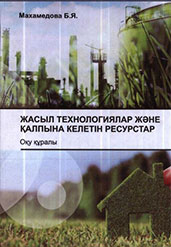
Жасыл технологиялар және қалпына келетін ресурстар: Educational is intended for higher education institutions// B.J.Mahamedova, Almaty: CyberSmith, 2021.-260 p.
In order to protect the natural environment, it became necessary to increase the resource efficiency and environmental characteristics of enterprises and entire industries, that is, the use of new technologies in the use of natural resources, and the active transformation of the environment into a “green” one. and the new direction is an urgent problem that arises today.
Modern new indicators of the terms “green technologies”, “green city territory”, “green transport”, “green economy”, “green infrastructure”, “green generation” have been prepared. sustainable development that meets their needs and contributes to this, the emergence of problems related to resource depletion, the effective use of natural resources for future generations; the study of new production technologies that can be completely restored or reused; Reduce waste by changing, reduce environmental pollution; replacement of production systems and consumption structures with new technologies, the use of innovations that develop alternative solutions to these technologies, proving that the anthropogenic factor is associated with the use of fossil raw materials or chemicals harmful to public health or the environment; Theoretical material on the topic “generation” has been collected on the need to use “greening” programs and projects in production, agriculture, public life and “Green Cities”, “Green Transport”, “Green Infrastructure”, “Green Space” (Ecosystem economy and biodiversity), ecological lifestyle and “Green”.
The principles and methods of protection and regulation of natural resources and ways of rational use of the world’s biological resources are substantiated. The international legal mechanism of environmental protection and environmental aspects of sustainable human development are presented.
The textbook is written in accordance with the requirements of the RK MZHMBS 5.04.034 – 2011 and the current work program of the discipline and is intended for doctoral and undergraduates, as well as university professors, researchers involved in the rational use of nature.
